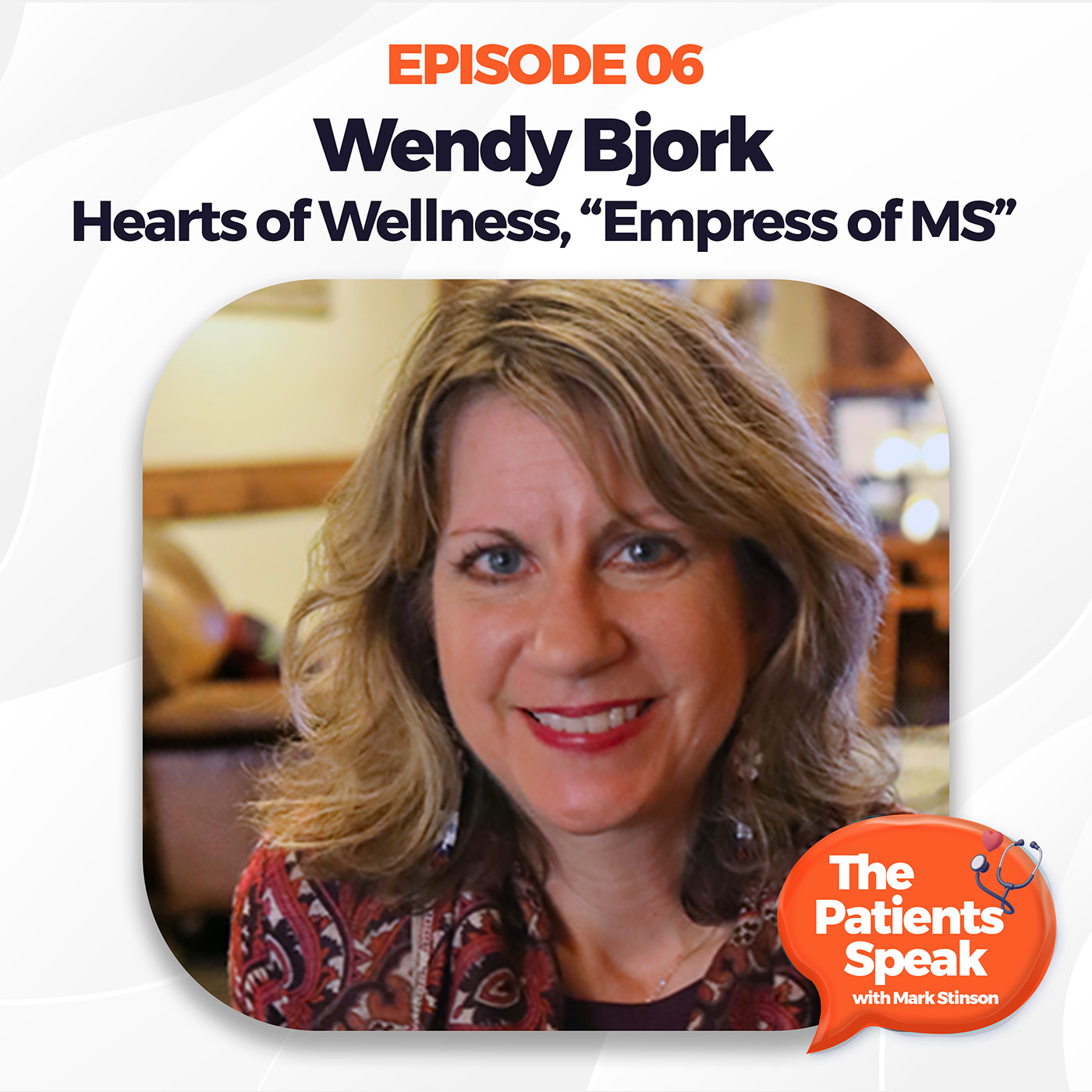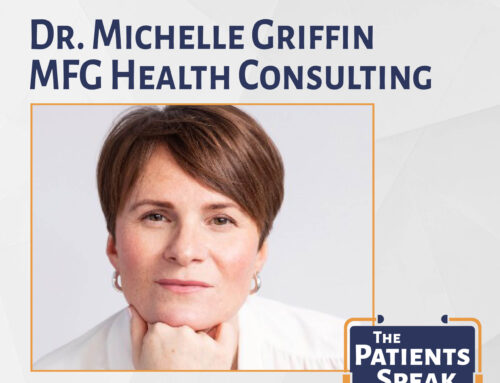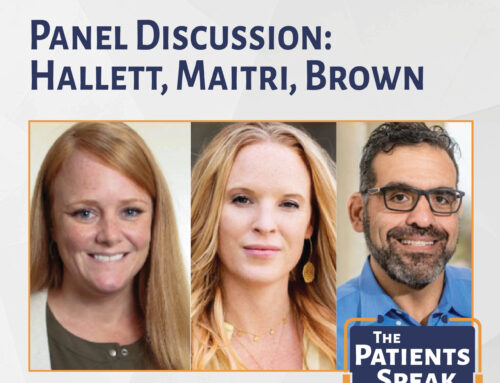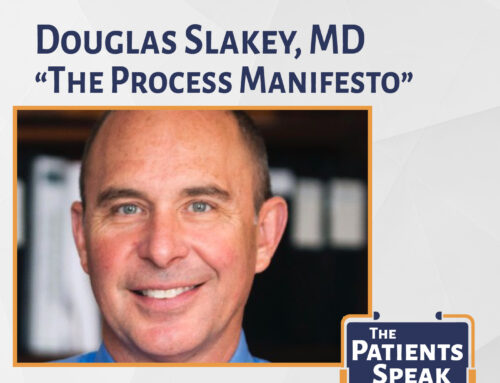Welcome back friends to our podcast, the Patients Speak. Where we learn about the voice of the patient and how the patients can contribute more to the science and business aspects of innovation in the world of medicine .
Our guest today is Wendy Bjork who is self-titled as the Empress of MS. She has been living with multiple sclerosis for over 35 years, and has now turned to empowering other patients. She’s a pioneer in advocacy and mentorship, and she’s even authored a book called Fired Up! She is also a frequent contributor to the National MS Society’s Momentum Magazine, and is regularly invited to expert discussions to share her story.
Mark Stinson, host:
Welcome back friends to our podcast, the Patients Speak. And if this is one of your first episodes to listen to our podcast, you’ve come to a great one to learn about the voice of the patient and how the patients can contribute more. And I’m so glad to have as my guest today, Wendy Bjork.
Wendy Bjork, guest:
Well, thank you for having me. I appreciate your invitation.
Mark Stinson, host:
Wendy has been living with multiple sclerosis for over 35 years, and yet she has now turned to empowering other patients. She’s a pioneer in advocacy and mentorship, and she’s even authored a book called Fired Up! She is a frequent contributor to the National MS Society’s Momentum Magazine, and regularly invited to expert discussions to share her story. And Wendy, I just have to start with the title that you have taken on for yourself as the Empress of MS. Let’s look under that tiara. Let’s look under that crown. Why does MS need an Empress and how do you feel about taking on that kind of a role?
Wendy Bjork, guest:
Well, I’d like to point out that this hasn’t been a journey of rainbows and cotton candy and unicorns and,
Mark Stinson, host:
For sure.
Wendy Bjork, guest:
The Empress title can apply to everybody. And I think from what I’ve learned in my journey, that’s what I want to share in the world so that everyone dealing with, whether it’s MS or something else, to feel like the Empress in their life and to have the strength and tenacity to stand up for themselves.
Mark Stinson, host:
Terrific. And why don’t we start there then in terms of standing up and speaking up for ourselves and just get right to the core of our topic. And that is if you were talking directly to medical providers, pharma companies, app developers, what would you say, look, if you really listened to us patients, this is what we want you to hear.
Wendy Bjork, guest:
I think this took a while for me to realize even, but our healing journey, our health journey, it’s all encompassing into a complete package. It’s not just about one thing or one quick fix if we have a problem. It all starts from top to bottom. It starts with our mindset. It starts with how we’re treating ourselves, how we talk to ourselves, and that can make such a difference that, and it’s such a small thing that people don’t even realize how our thoughts can affect us. And I think just having the whole picture, and maybe it’s a team that we need involved. You have your medical professional, your neurologist, and then you have other people in your life to help fill in these other gaps to carry on with your journey.
Mark Stinson, host:
And you really set out to be or develop anyway, the support systems, the support programs that maybe you felt you didn’t have as you were beginning your journey. How has that unfolded for you?
Wendy Bjork, guest:
I think in the beginning, I’m probably on neurologist number 10 by now. I think I saw five or six before they even diagnosed me and just participating in all the forums and the groups and hearing the stories. That’s really a common thread of it does take a while to pinpoint what people are dealing with, because I think a lot of these conditions overlap and maybe some doctors just don’t take it as seriously. So I think just knowing that fact, it just enabled me to be able to stand up for myself and say, look, I’m still dealing with this. It’s not in my head. And is that something to be taken lightly?
Mark Stinson, host:
And as you were taking that MS journey, if I could summarize it that way. And step by step, you said if only this could have been different, if only it could have been faster, if only I could have skipped a couple of steps, what do you think those might have been for you?
Wendy Bjork, guest:
I think first of all, and maybe this is still in development as far as technology, but I mean, it was the late 80s when I started having symptoms and MRIs weren’t a technology for diagnosing yet. It was still researched and being developed. And so when I had my first MRI, the first neurologist I saw said, well, you have white spots on your brain, but normal people do too. So I think just having a clear, be a clear path of these conditions and maybe not lumping them all together. I don’t know if that’s even possible yet.
Mark Stinson, host:
And some of the other parts of your program, you say, fill in the gaps. There are so many gaps in both knowledge, of course, but also sort of the empowerment feeling of patients like you. That really can you step up? Can you have a conversation? Can you spend more than a couple of minutes with your doctor? I mean, where do we need to fill in those gaps in your opinion?
Wendy Bjork, guest:
I think one big gap is nutrition. There isn’t a whole lot of nutrition taught in the medical field. And even when I asked my neurologist, it was probably 15 years ago, if I should start looking at what I was eating. He said it has nothing to do with it, but I can tell foods that are inflammatory definitely make me feel worse, whether it’s in my digestive system or my physical abilities, I think it’s all definitely correlated together.
Mark Stinson, host:
And when you’re together, whether it’s real or virtual with other MS patients, are they lost? Are they unsupported? Or as a rule, do you feel like we’re getting more educated, we’re getting more empowered, we are doing the things that need to be done? If I could generalize that maybe.
Wendy Bjork, guest:
I think in general, maybe it’s starting to tilt towards the good direction, but I think there’s still too many doctors that are still just focusing on one thing, is the medication. And I think it has to be a broader vision. You can’t just focus on one thing. There’s never one quick fix for anything. And as far as support, I think a lot of patients feel unsupported. A lot of spouses leave actually, because they just can’t deal with this diagnosis. And I don’t think it’s just MS. It’s any kind of diagnosis that’s serious. There’s people just can’t handle being in that situation. And I think that’s a huge gap is the support part of it.
Mark Stinson, host:
Well, and maybe that’s something that we ought to drill down a little bit more is this family relationship. You mentioned partners and spouses and how it’s really affecting relationships there. You’ve also written some blogs on parenting and relationships with children. What do we need to know about again, you get deeper into the patient’s journey and you realize we’re not just talking about the symptom effects, but we’re also talking about the impact on families and relationships. What should we hear about that?
Wendy Bjork, guest:
I think at the beginning, it’s a traumatic experience to receive this crushing diagnosis. And it’s so important for people to have someone to talk to and objectively not just to talk to, and then receive tips on what they think they should be doing. It’s common for everybody want to help each other, but it doesn’t help to hear what someone else did that would cure you. Those words are completely unhelpful. I think maybe it just goes back to everybody being kinder to each other and nonjudgmental. That’d be a huge task, but that would be a big hurdle to cross over. So maybe people would have a circle around them that is helpful and supportive and objective.
Mark Stinson, host:
Well, and you work as I mentioned, in the introduction with the National MS Society writing for the magazine, regularly writing blogs and sharing stories. What do you think the Society’s role and really you were talking about moving from these one off stories and tips to really sort of what best practices, evidence based, what’s the role of the larger group in the organization in helping patients connect with these valuable information resources?
Wendy Bjork, guest:
I think the MS Society does a good job of facilitating a lot of good information. Their website has tons of information to seek out. And I think that’s a great place to start, especially if someone’s newly diagnosed and that still doesn’t have the human factor of being one on one, talking to somebody that’s having that ear, especially having the ear of someone who is living with it and dealing with it.
Mark Stinson, host:
And in your book, you share a lot of these insights. Fired Up, I mean, there’s a certain attitude there. What do we need to hear about fired up? And again, if companies or innovators and developers were thinking about new things to help the patients in their fired up journey, what do you think those would be?
Wendy Bjork, guest:
I think just letting people know MS isn’t a death sentence and I know there’s other very serious illnesses out there that can have unwanted endings, but we’re here to live our life and life throws all kinds of challenges at us. So it’s up to us to I think, be our own advocate and stand up for ourselves. And I think that’s why fired up was the perfect theme for me to just keep going. You got to find that resiliency. And I have to tell you, I wasn’t in this spot for the first 20 years of dealing with MS. I was on the roulette wheel of just like I said before, going to the doctor asking questions that I thought might help me and then I would just get shot down and then you just kind of leave. And you’re just kind of disappointed, because we’re always looking for the next thing to help us. So I think, like I said, just having that ear and objectivity.
Mark Stinson, host:
And I even find this term living with MS. We try not to say we’re suffering, we’re down and out. And no matter how many years I have also been doing this with all sorts of diseases. Don’t say asthmatic, don’t say diabetic, they are living with a condition. What’s the living part for you? What do we need to hear more, less focus on the symptoms and the disease and more with the living?
Wendy Bjork, guest:
I actually call it navigating because every day is a new day.
Mark Stinson, host:
Very good. Yeah.
Wendy Bjork, guest:
And we have to see the illness as a separate entity otherwise it just becomes part of us. And I think if we see it separately, then we can deal with it better. If somebody says something terrible to you, you don’t have to keep that inside, you can dismiss that. So I think that’s part of navigating it, is just not keeping it internal.
Mark Stinson, host:
Well listeners, I think you should rewind this and underscore this word navigating. It does really take you in a different direction. That you’re navigating life and you want to seek wellness. You want to seek improvement in your symptoms, but it is a navigation, isn’t it?
Wendy Bjork, guest:
Yes. Because I mean every day is full of choices. You can eat that big bowl of ice cream with a chocolate on top. That’s loaded with sugar but,
Mark Stinson, host:
Thank you.
Wendy Bjork, guest:
You might feel terrible.
Mark Stinson, host:
Yes. Well you have a quote highlighted on your website, Wendy, that says, “I’m not a product of my circumstances. I’m a product of my decisions.”
Wendy Bjork, guest:
Yes.
Mark Stinson, host:
A great Stephen Covey quote. What is it that we need to learn from that quote about our decisions? I mean the ice cream is just one of them. I’m sure.
Wendy Bjork, guest:
Yes. Like I said, each day is a reset and we have a whole day of 24 hours full of choices, whether that’s what we use for our laundry soap. Do you need the synthetic laundry soap that smells like fake lilacs because that just stays in our skin all day and causes inflammation. And I just have to say, I love Stephen Covey. And I was lucky enough back when I was in the early 90s, when I was dealing with this, initially my boss was very into personal development and it was not cool at the time. And he sent me to a Stephen Covey workshop for a week and I believe it was to have the tools to have a good mindset and to be a good employee and just to be a better human. And there were several others he sent me to as well.
Mark Stinson, host:
Very nice. Well, some of our previous guests who are with some of these pharma and biotech and device companies have mentioned that they are really trying to develop programs and solutions beyond the medication. That certainly we would like medical advancements and clinical research. But what sort of things beyond the medication could you see would really help you and patients like you?
Wendy Bjork, guest:
I think, like I said earlier, it begins in our mind. I mean we have 50 to 60,000 thoughts per day and 70 to 80% of them can be negative. So if we’re feeling and thinking that we feel awful and we’re angry at our body because it doesn’t work like it used to, we’re just setting ourselves up for a bad day and maybe more symptoms because we’re now stressing ourselves out. So I think having the good programs of giving people, the tools to navigate this life is really important.
Mark Stinson, host:
And one piece of that development is certainly clinical trials, research, patient input. What do you see as the possibilities of people getting involved more in that development rather than just sitting back and waiting? You’re really encouraging us to be more involved. What do you think people could do and people with MS could do to step into that development process more?
Wendy Bjork, guest:
Maybe having conversations with the pharma companies. Instead of it just being completely separate, have more involvement at the patient level. I mean, MS has been around since 1395. I think it’s time we really get to some of these deeper roots of what causes it and what’s perpetuating it to keep going.
Mark Stinson, host:
Well, underlying that statement is there must be a better way. There must be a better way. That’s what I’m hearing anyway.
Wendy Bjork, guest:
Yes.
Mark Stinson, host:
Is that your sense?
Wendy Bjork, guest:
It is. And I think it just comes down to all these different components of living a healthy life. In addition to what medicine has developed for us.
Mark Stinson, host:
And keep navigating that. I do love the National MS Society, magazine’s name Momentum. And I’m curious how you interpret that word. Why is momentum so important?
Wendy Bjork, guest:
I think we have to keep moving forward. The past is the past. And if we’re living in the past, then we’re just moving backward or standing still. You just have to keep taking the steps forward for yourself, for your family on your journey.
Mark Stinson, host:
Well, folks, my guess is Wendy Bjork. She is the Empress of MS. We’ve been talking about that kind of empowerment. I saw on one article, Wendy, that someone even added warrior Empress or warrior queen to this title. There is kind of a warrior mentality we need to take sometimes isn’t there?
Wendy Bjork, guest:
We have to be careful though, because it’s how we define the warrior. Is it the warrior in the battle or is it the warrior that’s just standing up and taking these steps day by day? Because if we feel like we’re in fight and battle mode, then we’re back to stressing our adrenals out and being in survival mode. So it is a fine line of the warriors, I think terminology. And I do see the word fight a lot and I just would like to delete that word because it goes back to stressing our body out.
Mark Stinson, host:
Well, let’s drill down on that a little bit because I too see a lot of this. Hey, you’re fighting with MS or you’re fighting against MS or a 5K run to fight MS. Tell us more about how you interpret fight and maybe a better way to look at it.
Wendy Bjork, guest:
I think the navigation word is good. It’s a good blanket word. And when we’re talking about fighting, I mean, immediately, our brain is thinking, oh, now we’re in fight mode. So it’s time to ramp everything up, get into survival mode. And you go back to ancient history, we did have to fight. We had to be worried about tigers eating us or other animals attacking us because we lived in a cave, but we’re safe now for the most part, we don’t have to be in a fight mode. We can just live our life, navigate it as it comes.
Mark Stinson, host:
So helpful. Well Wendy, how can we connect with you and learn more about your work? Because I know that there’ll be people listening who do want to connect with you and learn more.
Wendy Bjork, guest:
Sure. My website is heartsofwellness.com and I have a lot of my interviews and podcasts, and I’m actually starting a new show where I’m a contributor on the priceofbusiness.com. So I have a new segment called igniting your dynamic self series.
Mark Stinson, host:
Wonderful. And I think that brings up the kind of, again, going back to living with and navigating with, and I’ve even found myself as I reflect during this conversation, I keep saying patients, patients, patients, but there’s people and people have jobs and people have businesses. And that has to be part of our thinking, doesn’t it?
Wendy Bjork, guest:
Yes.
Mark Stinson, host:
Very helpful. Well, Wendy, before we close, I’d love to now kind of back up and take a 50,000 foot view of our conversation and see how you would summarize things. If someone said, Hey, you had a great podcast interview, what was it all about? What would you take away from our conversation today or emphasize for some of the listeners?
Wendy Bjork, guest:
I think the thread to go away with is just everybody needs to give themselves grace. We’re way too hard on ourselves. We see people doing something we want to do. And even if we’re aspiring to do it and working towards doing that, maybe that’s going to take some extra steps. It’s not going to happen overnight. And trying new things. That change might not be felt until 90 days later. So I think it all goes back to just being patient with ourselves and giving ourselves grace.
Mark Stinson, host:
That’s great. Certainly from the MS patient standpoint and maybe a call to action to the companies that might be listening, perhaps on navigation. What would you send us away to go do after this?
Wendy Bjork, guest:
I think just be kind to somebody. Do something random for a stranger, because you might be the only person that talks to them nicely that day. We live in such a, I think even since COVID has gotten worse, that we’re just all in our own lane and we just need to be kinder to each other.
Mark Stinson, host:
Wonderful. Thanks for sharing that. Well, listeners, thanks for coming by to our new podcast. We call it the Patients Speak because we want to be sure we’re underscoring the patient’s voice in drug development, new device creation, new diagnostic development, and even innovation of support programs or apps. And my guess has been Wendy Bjork. She’s an author, a mentor, a thought leader, and a coach in her own regard in terms of wellness and as we’ve coined today, navigating life with MS. So I really appreciate you coming on the program, Wendy.
Wendy Bjork, guest:
Well, thank you again. It’s been great.
Mark Stinson, host:
Thanks again. And listeners, come back again next time. We’ll continue these conversations that combine the science and maybe business aspects of innovation with the patient voice and what we need to hear. We really appreciate 83bar for sponsoring and producing these conversations. And we know that you’ll enjoy the next interviews with another innovative healthcare executive or patient advocate and what they can learn and what we can learn from them when we hear the patients speak. We’ll see you soon.





